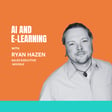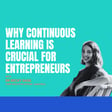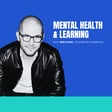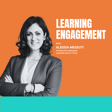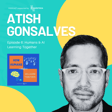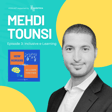Become a Creator today!Start creating today - Share your story with the world!
Start for free
00:00:00
00:00:01

Learning to Build a Learning Programme
Listen how UNSSC, the United Nations Staff System College leveraged some untapped technology and different learning methods to make sure people could still access great learning opportunities during the pandemic.
Featuring Julianna Bojko and Sofia Exarchou.
Transcript
Introduction to the Filmmaker's Diverse Skills
00:00:00
Speaker
I am an independent filmmaker, and that is usually what people see when they go to my LinkedIn page. What they don't see is that I'm also an accountant, a webpage developer, social media manager, graphic designer, and copywriter. I've had to upskill and learn new platforms in order to do all of these things because I had to in order to make my work possible.
Interactive Experiences in Learning with UN Guests
00:00:22
Speaker
We're going to hear from a team who have had a similar experience working with new platforms to create learning experiences for the United Nations in today's episode with our two guests, Yulika and Sophia. You're listening to How Humans E-Learn Together, discussing the impact human-connected interactive experiences can have on the human capacity to learn. This is a podcast for trainers, educators, learning and development professionals, coaches and mentors,
00:00:52
Speaker
the education technology community, and anyone who wants to leverage new ways to reach lifelong learners, and a look at what others in the e-learning industry are doing to make that happen.
Adapting and Unlearning: Lifelong Learning Processes
00:01:05
Speaker
Today, I'm speaking with Yuleka and Sophia. Hello.
00:01:09
Speaker
Hi. Yulka and Sophia work at the United Nations System Staff College. I think for me it goes way back to my earliest of memories, like learning new things has always given me a sense of purpose and meaning. And nowadays I can say that I have just embraced, let's say, the fact that each day is a new chance for us to discover something new and feed our curiosity. And that's why learning is a lifelong and life-wide process to me. Yulka, how about you?
00:01:39
Speaker
Well, I would say one of the key skills, especially nowadays, is being able to adapt to the rapidly changing environment, which requires not only learning, but also relearning and unlearning what we know on different stages of our lives. And for me personally,
00:01:56
Speaker
or rather professionally, a big part of my everyday work is learning new things as every project and its topic is different and I need to fully dive into the subject matter and understand it in order to be able to propose and create an effective learning solution. I think this is also why I do this work as it feeds the curiosity of the world that Sophia mentioned before.
00:02:19
Speaker
I'm going to let Yulika and Sophia introduce themselves and explain their roles.
Roles and Contributions of UNSSC in Global Learning
00:02:23
Speaker
My name is Sophia. I'm happy to be here. So I'm a professional in the field of learning and education. I have worked as a teacher with a focus on student learning and engagement in different contexts.
00:02:35
Speaker
But nowadays, I'm more active in the field of adult learning and learning technologies. I'm Yoko. I'm an organizational psychologist. And in the past, I've worked in learning and development departments, supporting training programs in the organizations. In the last few years, I specialized in the area of instructional design and e-learning. Together with Sophia, we work at the UN System Staff College, which provides learning and development opportunities to the UN staff.
00:03:03
Speaker
Let's say I'm new to working at the United Nations. Could you share how UNSSC supports the UN system through their services that it offers? So the main role of UNSSC is to support reaching goals of the 2030 Agenda, the Sustaining Peace Resolutions and the Management Reform. We do it by delivering a mix of knowledge management, training and continuous learning solutions for the personnel of the United Nations system.
00:03:31
Speaker
Many organizations and professionals working in human rights, peace and security, and development see the college as their go-to learning institution. Exactly, and Yolga and I are part of UNSSC's Knowledge Center for Leadership and Management, which is focusing on supporting the leadership and management culture transformation.
00:03:52
Speaker
And one of our team's goals is to ensure that UN entities and partners have the resources and services they need to better shape, let's say, the future of their work, as well as strengthen their internal capabilities.
Pandemic-Driven Shift to Online Learning
00:04:05
Speaker
Speaking generally about the services offered through the Staff College, are they all e-learning courses or are there some available in person? Before the pandemic, there was a strong presence in the face-to-face and blended programs, combined with some purely online offerings.
00:04:21
Speaker
However, the pandemic challenged us a lot and we tried to respond to the emerging needs. So after the disruption occurred, we immediately took action. So we used the let's say untapped technology and different methods
00:04:36
Speaker
to make sure people could still access great learning opportunities. And even though we were working from home, we supported each other very closely and we learned how to use new digital tools. We started creating learning programs that would help us work better towards our goals. And we also became more adaptable, resilient and agile in the process.
00:04:56
Speaker
So as Sophia mentioned, in 2020, the college started offering all its courses online for the first time ever. But currently, we are back to offering face-to-face, online, blended and hybrid programs. Currently, we want to ensure that learners can select the learning modality that is best for them.
00:05:15
Speaker
Depending on the program, learners may attend the course physically at our two main campuses in Turin or Bonn. UNSSC teams also deliver trainings in different locations around the globe whenever it's needed and requested. That's really interesting.
00:05:32
Speaker
There was a more traditional method, obviously, before the pandemic. Everything upended during the pandemic and now you've opted to go back to having anything that works for the people that you're, you know, essentially for your learners. It makes learning, I think, more accessible to so many people if you really take that into consideration because everyone learns differently.
00:05:53
Speaker
How do the courses offered make a difference for the staff in the office compared to in the field? So the UNSC is offering a variety of learning modalities at the moment. And as such, it has a strong presence, not only in the headquarters, but also in field locations. And a lot of our workshops conducted by our colleagues take place in various parts of the world. And it's one of the ways we are trying to meet the needs of our learners and partners.
00:06:20
Speaker
And concerning the work that the two of us do, we try to ensure the staff college has also a strong presence online so that colleagues in need of more flexible learning solutions can still pursue their professional development. I, for example, am more involved in online learning by supporting the Blue Line, which is a learning ecosystem for personalized and self-directed learning created by UNSCC. And at the same time, I support agencies by trying to meet their learning management system needs.
00:06:50
Speaker
I on the other hand work with various UN organizations to create programs and online learning solutions that will be strictly aligned with their strategic goals and tailored to the specific challenges each organization is trying to address. So that's a really great background I think for all of our listeners to understand kind of the depth and breadth of what you both have to do when it comes to
00:07:13
Speaker
you know, maintaining this learning for UN staff colleges. So a lot of work I know goes into designing an effective e-learning course. That also means a lot of resources working with different stakeholders. What are some of the things you've learned along the way that our listeners could take away from your past experiences working with others to create these courses or platforms?
Principles of Effective E-Learning Design
00:07:36
Speaker
Well, my first immediate reflection would be that less is more. So there's usually a lot of attention paid on how well one can use an authoring tool or create an interaction or an animation and so on. But little attention is given to the mastery of the design. And by that I mean designing with learners in mind, cognitive load, accessibility as you mentioned before, and other considerations. Most of the time simplicity pays off there.
00:08:05
Speaker
And to add to that, I think there is the thing that strictly is related. Plan enough time for the needs assessment. Make sure you always do it well to identify the performance change that can be achieved with the learning solution that you design. You also have to understand your audience. Maybe you can create a simple persona that you could later refer to in the design phase that is really helpful.
00:08:30
Speaker
And believe me, it will later pay off with the development of more effective and impactful training.
00:08:38
Speaker
And actually, that reminds me, now that Juleka mentioned planning, another thing that perhaps for me would be quite of a lesson learned would be that onboarding new team members takes time, but it's time well spent in a project. So in that very moment when you're trying to meet a deadline and it might seem like a bad call to onboard a new team member or to spend some time on that thing,
00:09:04
Speaker
it is actually the best decision you can take, not only for you, but also for the team and for the new person joining, of course.
00:09:12
Speaker
And also from my side, one last thing I would say that testing and piloting are essential, but they always or almost always take longer than we think. So do factor more timing for those things. The insights will make your project better. They will show you the weak spots to eliminate or what you need to improve and make the final solution much more valuable. So trust the testing and piloting process, even though it has some delays and ups and downs.
00:09:41
Speaker
And since so much time that we spend on planning, analysis, design and development, and we finally get the learning product done, let's not forget to communicate the project.
00:09:56
Speaker
There are many great initiatives that died because no one ever heard about them or people heard once. And since the message wasn't repeated, they forgot. And I think each one of us either experienced something like this or we were in the project that failed in this last phase. So remember, the journey doesn't end with putting the training on the learning platform. It has to be constantly communicated.
00:10:21
Speaker
I'm a storyteller, as you know, and I love stories and learning from other people's stories and experiences. So if you both could share your experiences that led you both to be inspired to create a course based on your own learning experience on onboarding, could you bring us along your creative process for how it started, the challenges you faced and what the ultimate outcomes
Innovative Onboarding Game During the Pandemic
00:10:45
Speaker
were? Like what, how did the story end?
00:10:49
Speaker
So I think here I can share my personal story as I joined the Staff College remotely during pandemic, just the moment it started in April, 2020. Since I didn't have a chance to have a tour around the offices that would normally take the place, I decided to schedule some virtual coffees to introduce myself to the team and to get to know other team members, as it would happen in the physical environment, having some coffee together.
00:11:17
Speaker
Apart from the fact it was quite vulnerable moment for all of us, it really helped to build some foundation for future collaboration. At the moment I could join the team physically in the office a couple months later and see them live for the first time, we already had this connection built. And I think in general this time of pandemic showed us that human connection is something irreplaceable.
00:11:43
Speaker
Exactly. And actually, I was one of the virtual coffees of the first ones that Yolka took, and I think that shows, given the fact that we are both here today. But also, when it comes to the onboarding project, last year, we both participated in a workshop where we got to brainstorm on ideas for more human-connected learning. So we had this kind of light bulb moment to create a two-player onboarding game for the team's new home-based members.
00:12:14
Speaker
from our experiences like the virtual coffees we had and so on. And our goal was to connect people working remotely with anyone like us working in the office and to allow for more personal connection and get to know the person in different contexts as well.
00:12:29
Speaker
So as a result, we created the game that takes place in the first two weeks of the new person joining. New colleague is paired with the manager or the body. And they start the game that is supposed to be an engaging way to learn about our team, facilitate connecting with other team members, and by participating in the missions to completely give the sense of agency from the very beginning.
00:12:55
Speaker
Exactly. And actually the goal of the game was to expose the new joiner to the team's routines and ways of working, like the things that I was telling Yulka while she was joining the college and so on. So this means that apart from learning about the team, the members, the projects and so on,
00:13:15
Speaker
We also had to replicate in a way the team's culture and its main characteristics, which was the hyperactivity and collaboration. Wait, hold on. Let me interrupt you both for a second. Let's just skip over the fact that you just said missions to complete. Is this like Mission Impossible? Are you sending people on James Bond adventures? Let's hope it's Mission Possible.
00:13:42
Speaker
Yeah, yeah. Was there a theme to this game? Like, or was it, you know, anything like those movie titles I just threw out or? Yeah, so we have like three missions people need to go on.
00:13:57
Speaker
The first one is, I think we are describing them later, right? In detail, like preparation for docking is the first one because it's all space related. Oh, okay. Space related. All right. I don't want to give away too much then. I'll let you bring us on the Star Wars adventure later, but, and sorry for interrupting you, but I just really wanted, I didn't want that to get missed by any of our listeners that, as to what kind of missions we were sending people on.
00:14:21
Speaker
No, no, no, we will describe them later. We will reveal the mystery soon. Okay, go ahead, please continue. So you were talking about the team's culture characterized by high proactivity and collaboration.
00:14:32
Speaker
Yep, exactly. And while we did get that right, namely show how proactive the team usually is or the team members are and very highly collaborative and so on, there were other components in the process that pose some challenges to us. For example, time was a big one. On one side, we had to allocate time to bring this new idea to life as it didn't only require
00:14:58
Speaker
Time from us to design and develop it, but it also required time from our colleagues to participate in the testing phase. And on the other side, we had to understand our users, namely our colleagues, very well. And I think this was probably the biggest challenge of it all, right, Yurka?
00:15:17
Speaker
Yes, I would totally agree with this one and that is why we did two iterations of an onboarding game with strong storytelling components because we wanted to ensure that colleagues are engaged and they move smoothly towards successful completion. So we actually, after doing those two iterations, we learned a lot and we changed a couple of major things in the design itself.
00:15:44
Speaker
So Mission Possible became possible. But no, really, I know that you used an outer space theme, which I do love, in the learning experience, which is not something you get every time, that you have to do kind of an onboarding, really. So what inspired you to use this theme, and how did you make use of storytelling to bring learning to life?
00:16:06
Speaker
It all started from the moment we created a visualization of the Knowledge Center for Leadership and Management, which is the team we belong, because we wanted to incorporate this visualization in our team's knowledge base. And because the team is divided in sub-teams,
00:16:22
Speaker
we kind of came up with the idea to present our team structure as a solar system like kind of graph and we kept this storytelling of like space and the solar system throughout various learning types and the components of the knowledge space and in this way we were trying to create a consistent narrative.
00:16:44
Speaker
Also, I think that both me and Yulika, we were quite excited about the space team itself. So it was also another fun component for us during the creative process. We are. And I think it was amazing to work on this because it was actually fun to create. And the game itself, the participant plays one of the two roles, spacecraft commander, which is a manager or a body, and mission specialist, which is a new joiner.
00:17:14
Speaker
To follow the space narrative, we use the reference to space missions, as you already noticed, Lauren, and specific jargon and use dedicated graphics of astronauts, planets, spaceships. The first few days are called preparation for docking.
00:17:36
Speaker
And once docking phase is completed, meaning our new colleague got the basic orientation in the team universe, let's call it like this, the missions start and get more complex as participant advances.
00:17:51
Speaker
Exactly. So the first actual mission is called the Pathfinder, and it focuses on creating a flight plan that helps to combine the new colleagues' skills and interests with the projects that the team is having.
Impact of Gamified Learning on Remote Collaboration
00:18:04
Speaker
And then there's a second mission, which is called the Curiosity rover, and that builds on the outputs of the previous one, which allows the new colleague to jump in their first ever little project in a safe, let's say, environment.
00:18:16
Speaker
And what we wanted to do by this design, we wanted to engage the new joiner in the mission in which spacecraft commander assists and provides feedback, which should help in building the connection in those first few days, and at the same time equip new colleague with the required knowledge and confidence to get started. So everything that you just described actually seems quite
00:18:42
Speaker
out there right in space and and having that kind of different association of learning how to onboard somewhere and do you feel that your approach made humans more connected to each other in the process when they might ordinarily feel they would just be clicking through a course on their own?
00:19:02
Speaker
That's a great question actually, Lauren, and I think that from my side, for example, the chance to meet our colleagues working remotely and kind of see them as whole persons outside of their desks, sending a video using their phone while in their kitchen, which is kind of like what the tool that we use does, right?
00:19:24
Speaker
was something that really complemented some of the missing information of one's personality that you actually do not get to experience or see if somebody is entirely like working home-based and you see them only through the computer.
00:19:38
Speaker
Exactly. I think we wanted to fill in this gap of missing connection that may appear for colleagues working remotely by creating this exchange space and filling up support in the onboarding process, especially when they are not physically present in the office. And this kind of natural interaction that would happen in that setting is just limited.
00:19:58
Speaker
With this approach, we tried not only to connect new colleagues with their managers or buddies, but also to go beyond the app and facilitate connecting with other team members as well, just for example, to schedule those virtual coffees with them.
00:20:14
Speaker
I like what you did there. You look at exchange space. It's a little play on wind. I mean, at some point someone must have had like their cat come into a frame or recording, right? And act as, you know, like an alien creature or something. But I could see where you could have a lot of fun and get to know each other's personalities quite well. And so with that in mind, would you do it again? And if you did, would you do it any differently?
00:20:44
Speaker
Speaking for myself, I would definitely do it again, yes. Totally agree. We had fun during the creation process from the very beginning when brainstorming on the concept through development of those themed graphics and narratives up to communicating it with the team.
00:21:00
Speaker
yeah actually the storytelling component like got us a lot we even created a video trailer of the whole initiative that was literally like a launch a little launch of the project um but for sure along the way uh there were some things that we might
00:21:17
Speaker
do differently knowing what we know now, for example.
Lessons Learned and Future Onboarding Innovations
00:21:21
Speaker
So we know that big ideas have small beginnings. So if I were to do it all over again, and perhaps Yurida would agree with me on this one, we should have started smaller or we could start small or smaller in this case.
00:21:35
Speaker
Yes, I think we were really creative at the very beginning, but I think it's like with craving the sculpture, so you need to kind of get rid of some of the elements to make the final piece simple but yet effective.
00:21:54
Speaker
And in terms of what could be done differently, I think communicate, communicate, and once again, communicate. I think our next goal would be to make sure everyone is on board with this onboarding initiative. Okay, so you've already conquered space, though. What other big or small idea would you have next? Just if you could do your own personal thing doesn't have to be an official staff college course. If you could make another learning experience or create another world, what would each of you make?
00:22:22
Speaker
Well, I think we've had like a lot of great ideas during the process that we actually had to compromise because of the length. I was thinking the same thing exactly. Yeah, of the game. So we kind of took the whole like spacecraft way too far.
00:22:38
Speaker
We reached the sun basically. Exactly, exactly. So that's why I was saying like we start small because we put a lot of work in the beginning and we made it like very complicated, very nerdy.
00:22:57
Speaker
It was very nice for us, I think, because we are that way, but then too complicated for others. But we have a lot of things like we wanted to give also the mission specialist would be giving feedback to the spacecraft commander. And so the process would go vice versa. So it would be nice.
00:23:18
Speaker
Yes, we planned initially for a longer game, let's say, that would involve more complex, we wanted to make it kind of to assist through those even first two months, not even two weeks, but two months of the new person joining the team. But I think we need to start small.
00:23:45
Speaker
and see how it goes. And as we said, starting smaller might be better in this case, and piloting and testing to see what works. So our main takeaways from today are to have big ideas to start small.
00:24:04
Speaker
and to have good communication in between all of that. If you'd like to get in touch with us regarding today's episode, or there's something you'd like to learn on a future episode, send me an email, Lauren at Gamoteca.com. That's all for this episode on how humans you learn together, supported by Gamoteca. Until next time.
